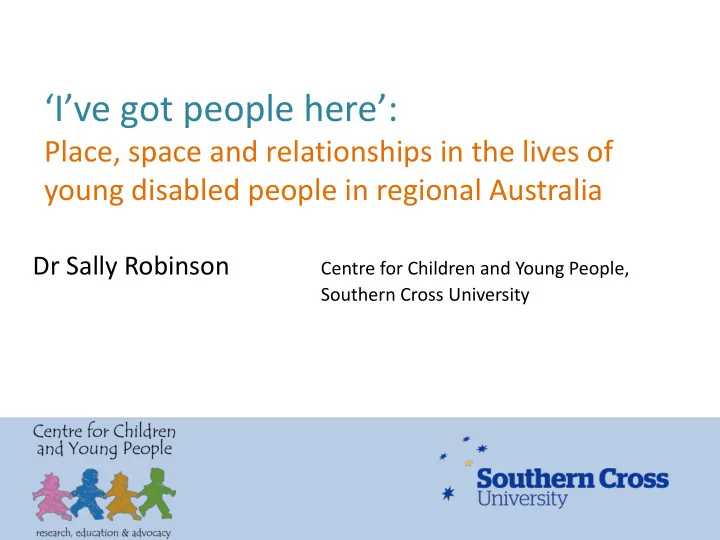

‘I’ve got people here’: Place, space and relationships in the lives of young disabled people in regional Australia Dr Sally Robinson Centre for Children and Young People, Southern Cross University
The other partners in this work: • Prof Anne Graham, (Centre for Children and Young People, Southern Cross University) • Assoc Prof Karen Fisher, Dr kylie valentine (Social Policy Research Centre, University of NSW) • Prof Malcolm Hill (Strathclyde University) • Children with Disability Australia • NSW Council for Intellectual Disability
Aim of project • Explore the lived experience of belonging and connection with and for young people with cognitive disability living in regional communities. • Support these young people to explore the enablers and barriers to belonging and connection, including any perceived impact of living in a regional community.
Conceptual framing • Drawing from both childhood studies and social relational approaches to disability. (Tisdall, 2012; Goodley & Runswick-Cole, 2011; Hill & Wager, 2009; Sloper & Beresford, 2014; Watson, 2012). • Shared constructs: – Social constructions of both childhood and of disability – Contesting normative narratives of child development – Allowing for the interrogation of social policy and structural discourses on disability, inclusion, exclusion, and uses of place and space
Methodology • Participatory qualitative research – Centrality of participants – Voice – Accessible methods • Social geography (Imrie & Edwards, 2007; Hall & Kearns, 2001; Hall, 2010). – Place – Space – Relationships
Research Methods • Interviews • Photographic projects – based on photovoice • Surveys
Doing the project • 3 communities – regional towns in NSW, Victoria and Queensland • 30 young people – 12 – 24 • 6 months in each community • 2 interviews + informal meeting and conversation + photo uploading • Survey across Australia
Interviews • Mapping • Conversational • Experiential • Adaptable • Person-as-expert • Not about disability • Established B&C • Set frame for project
Establishing what it means to belong
Photography project • Workshops – start and mid point • Support resources for young people • Uploading to Flickr • Support for disability orgs to facilitate • Analysis interviews • Exhibitions
Photographing
Analysing
Exhibiting
Young people’s connections to place and people Places: People: • Home • Family • Virtual worlds • Friends • Disability services and • Support workers schools At soccer, best buddies and mates. By Martin
How these connections affected identity • Capability • Creativity • Gender • Culture • Transitions • Disability and impairment • Regionality and rurality Drum snare. By John
Being regional • Sense of place – in or out of town • Limited access to activities, goods and services • Expanded sense of distance • Being known – supportive AND intrusive • Harder for some to reach ‘adult’ milestones (jobs, leaving home) Dad picks me up each fortnight and takes me to his house. By Katie
What helped young people feel a sense of belonging and connection? • Mutuality and reciprocity in relationships – Family as a foundation – Depth in friendship – Feeling a sense of alliance with others • Recognition of capability – Being respected – Being understood and valued – Having a sense of agency • Sense of place – Feeling and being safe – Feeling comfortable, relaxed and secure – Physical and virtual connections Minyon Falls. By Possum .
What hindered belonging and connection? • Discord in families • Loneliness • Unacknowledged loss & grief • Violence & abuse • Struggle in accepting unwanted care • Feeling like you don’t fit in • Lack of access • Lack of authority over decisions • Not having enough to do Unwanted support. By Jums • Distance/lack of transport
Implications for young people, policy and practice, and research For young people: . • It was important to young people that their capability and agency is recognised • The multiple identities of young people need to be recognised • Relationships are critical for establishing and sustaining young people’s sense of belonging and connection • Being known and valued is a core requirement for a secure sense of belonging and personal identity
Implications (contd) For policy: • Support needs to focus on relationship development as a priority • A dual focus on developing the capacity of individual young people as well as groups and communities is needed • Virtual connections matter to young people, and should be explored further for connecting young people and for information dissemination • Violence and interpersonal harm damage belonging and connection. Action is needed in prevention, minimisation, response and recovery. • Sensitive support to acknowledge and address unacknowledged grief and loss is needed for young people
Implications (contd) For communities • Place is a foundational site for relationships, and young people avoid going where they don’t feel welcome. • Living in regional towns can make it harder to meet transitional milestones. For further research • Accessible methods such as these enable young people to share their experiences and generate rich and deep understanding of their lives • Emerging knowledge about belonging and connection needs further empirical testing using stronger conceptual framing • The high rates of negative experiences in young people’s lives warrant further exploration as a matter of priority • More research is needed to see how this study might extend or modify theories about recognition, identity, social inclusion and disability
For further information, and contact www.belonging.net.au – for some of the young people’s photography and the report: full, summary and easy-read versions Sally Robinson Centre for Children and Young People Southern Cross University sally.robinson@scu.edu.au +61 2 6620 3134
Some reflections arising from recent work…your thoughts, experiences? • the ethics and practice of research with young people with high(er) support needs • recognising the significance of negative experiences (individually and collectively), without allowing them to ontologically dominate • distinctions between policy-focused and theoretically-oriented research • tensions and opportunities in involving those who support young people in formal and informal ways
Recommend
More recommend